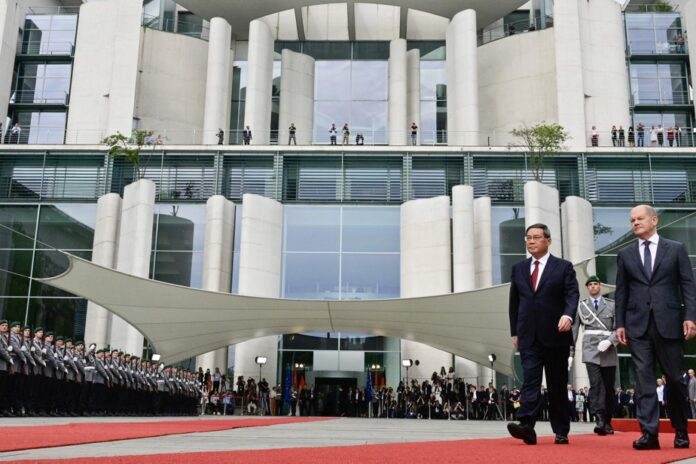The German government on Thursday approved its first national strategy on China, defining the Asian superpower as “a systemic partner, competitor and rival” and calling for a significant reduction in dependence on Chinese products, while maintaining economic ties worth hundreds of billions of dollars.
The new policy provides for export controls and investment verification of German companies operating in China to protect flows of sensitive technology and know-how. However, it does not specify how Germany plans to review Chinese investments in Germany, a point that has recently raised concerns.
Chancellor Olaf Scholz’s government adopted the 61-page document after months of discussions and delays due to disagreements within its three-party coalition over the strength of its position. The strategy echoes European Union themes of “reducing risk” in relations with China.
The government has said reducing reliance on Chinese producers and consumers will ultimately strengthen the German economy.
“We don’t want to decouple from China, but minimize our risks. This means strengthening our European economy and reducing dependencies,” said Annalena Baerbock, Minister of Foreign Affairs.
This strategy takes a tougher line on China than that taken by governments led by Chancellor Angela Merkel, who saw China as a huge growth market for German products.
This approach has established close relations with China, with more than a million German jobs depending directly on China, and many more indirectly. Almost half of European investment in China comes from Germany, and almost half of German manufacturing companies depend on China for part of their supply chain.
But supply chain problems wrought by the coronavirus pandemic have revealed just how dependent Germany and Europe have become on China for products ranging from drugs to processed minerals essential for green technologies. Russia’s invasion of Ukraine last year has also raised concerns that China is taking advantage of economic dependencies in the same way that Russia has exploited Germany’s dependence on its exports of natural gas.
As part of this strategy, companies are urged to “internalize more strongly” the geopolitical risks associated with their activities in China, in order to avoid having to resort to public funds in the event of a crisis. The government said it was working to put in place incentives to encourage German companies to diversify their business beyond China.
The policy also called for a reassessment of export safeguards, to ensure the protection of sensitive technologies, and underlined Germany’s intention to compile a list of technologies used in areas such as cybersecurity and surveillance, which would be subject to export controls.
“We understood that it is in our national interest to ensure our economic security,” Ms. Baerbock said. She added that Germany could not afford to have to “pay more than 200 billion euros to get out of dependency”, as happened when Russia cut off gas flows to Europe. western.
The Chinese government, through its embassy in Berlin, on Thursday took issue with how it had been portrayed in the policy, insisting that it was a partner of Germany, not a rival.
The embassy said in a statement that it “strongly opposes” efforts to “interfere in China’s internal affairs, distort and smear China, or even harm China’s core interests.” .
The question of whether and how companies will support this policy remains open.
“Volkswagen Group will continue to invest in China,” said Ralf Brandstätter, Volkswagen Director China and Member of the Board of Management.
“China is a dynamic growth market and a key driver of technological innovation,” he said, adding that it is “ultimately crucial to the global competitiveness of Volkswagen and the entire industry.” German automotive industry”.
The strategy will now go to parliament, where lawmakers are expected to start debating it when they return to work in September.















